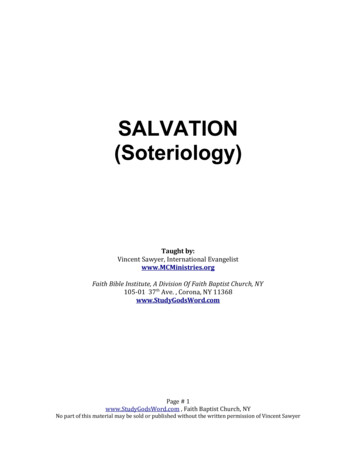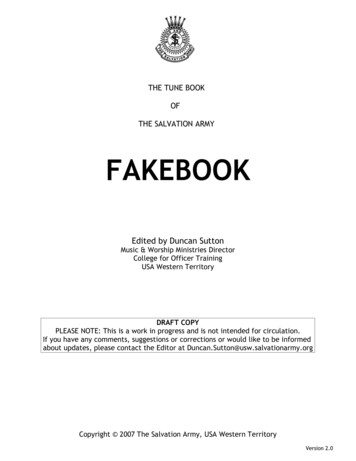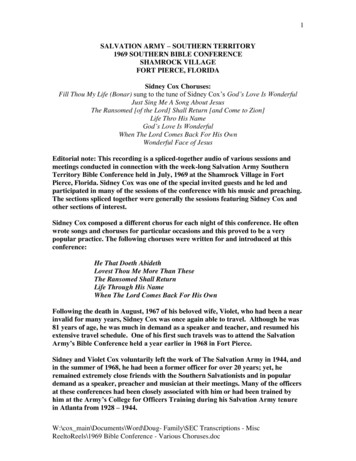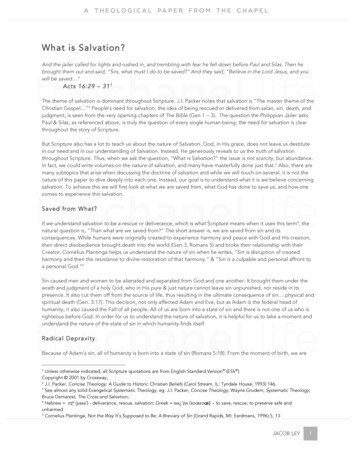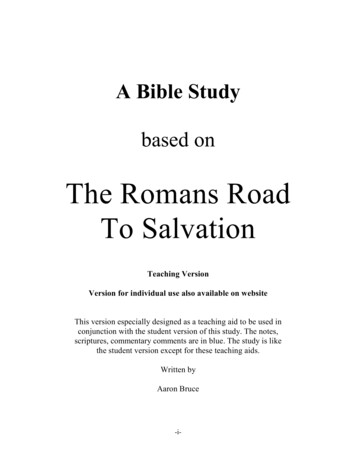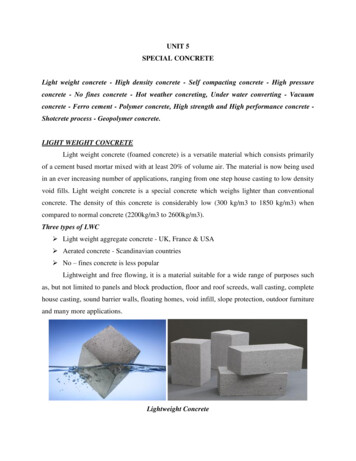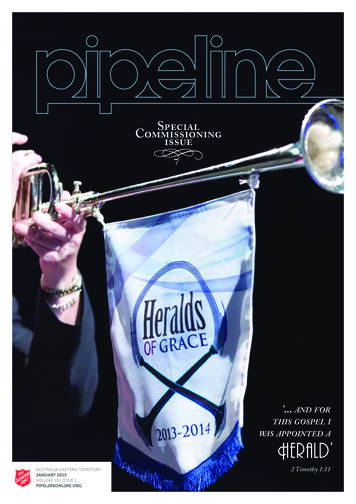
Transcription
SpecialCommissioningissue ‘. and forthis gospel iwas appointed aHerald’AUSTRALIA EASTERN TERRITORYJANUARY 2015VOLUME 19 ISSUE 1PIPELINEONLINE.ORG2 Timothy 1:11
28ABOVE: Every Friday night, 78-year-old Lyn Harley takes her pub ministry to 17 hotels in Bundaberg. It’s her way of giving back to Godand The Salvation Army. Read Lyn’s story, starting on page 28 of this issue.COVER STORY10 HERALDS PROCLAIM GOD’S GRACEFEATURES20 NEW LIFE AT SINGLETONThe Salvation Army Australia hascommissioned 15 new officers for servicein its Australia Eastern TerritoryREGULARS5SELF DENIALAPPEAL 2015Many children in Rwanda are very poor. Their parents fled the countryduring the genocide, and are now being told to return to their homeland bythe countries that took them in. Food, jobs and housing are in short supply.Local Salvationists are giving hope to Rwandan children and families byproviding housing, meals and education. They need you to provide the funds.TC@PIPELINE34 SOUL FOOD35 MISSION PRIORITIES40 ARMY ARCHIVES42 WHAT WOULD JESUS VIEW?46 COALFACE NEWS57 PROMOTED TO GLORYThree years ago, Singleton Corps was on the vergeof closing. It now has a large and growing kids cluband youth group, a new junior soldiers program isthriving and Sunday services have recommenced32BOUNDLESS REVIVES FOND MEMORIESIn the 1960s, Rhondda Kingston was part of a groupof young Australian timbreliists invited to perform atThe Salvation Army’s centenary celebrations. Laterthis year she’ll return to London for the Army’s 150thanniversary37 GOD’S ROLE IN HEALINGCaptain Brett Mitchell explores the topic of healingfrom a biblical perspective and offers a personalreflection in his role as the director of SalvosCounsellingThe Salvation Army WILLIAM BOOTH, FounderInternational Headquarters, 101 Queen Victoria street London EC4P 4EP André Cox, GeneralAustralia Eastern Territory, 140 Elizabeth Street, Sydney NSW 2000 James Condon, Commissioner, Territorial CommanderBruce Harmer, Major, Communications and Public Relations Secretary Managing Editor, Scott Simpson Graphic design, Kem Pobjie Cover photo, Carolyn HidePipeline is a publication of the Communications Team Editorial and correspondence:Address: PO Box A435, Sydney South NSW 1235 Phone: (02) 9266 9690 www.salvos.org.au Email: eastern.editorial@aue.salvationarmy.orgPublished for: The Salvation Army, Australia Eastern Territory, by Commissioner James CondonPrinted by: SOS Print Media Group, 65 Burrows Rd, Alexandria, NSW 2015, Australia, Print Post Approved PP236902/00023All Bible references are quoted from the New International Version unless otherwise stated.
tc@pipelineeditorialMaking a fresh start in faithWill you do it?SCOTT SIMPSON, Managing EditorFor many people, a new yearequates to the opportunity fora fresh start. Resolutions aremade to ditch old habits infavour of a new, healthier lifestyle.This issue of Pipeline is full ofstories about fresh starts. We bringyou a comprehensive coverage of thecommissioning of 15 new SalvationArmy officers who, later this month,take up their first appointments incharge of corps across the AustraliaEastern Territory. We also introduceyou to the cadets of the JoyfulIntercessors session who are about toenter The Salvation Army School forOfficer Training to begin two years ofstudy and preparation for officership.And then there’s our special featureon the rebirth of Singleton Corps,in the Hunter Valley region of NSW.On the verge of closure three yearsago, the corps, on the back of anexceptional children’s ministry and alot of hard work led by Captains Peterand Leanne Bennett, is now thrivingagain.All of these people are taking giantsteps of faith as they head into anotheryear, and yet they can stride outconfidently in the assurance that theyare following God’s will for their lives.Ah yes, that big question that is socommon among Christians – what isGod’s will for me?So what is the answer? Well, theBible doesn’t seem to spend too muchtime on providing specifics on thissubject, except to make this crucialsummary in 1 Thessalonians 4:3: “It isGod’s will that you should be sanctified.”. Now that, to me, seems prettyclear – God wants your sanctification.His desire is that you are made holy.God’s will is not so much about whatyou do, but who you are.COMMISSIONER JAN CONDON HAS ENCOURAGEDSALVATIONISTS IN THE AUSTRALIA EASTERNTERRITORY TO JOIN AN INTERNATIONALBIBLE-READING CHALLENGE IN 2015GOD’S WILLAs you flick through the pages of theBible, you’re going to learn that God ispassionate about changing the inneryou.He knows that if he can change youinto the person he wants you to be,then you’re going to know the answersto those “will of God” questions. You’llknow where you’re supposed togo, where you’re supposed to work,whether you should get married and, ifso, who to marry.It is this inner character that Paul isreferring to when, in Ephesians 5:17, hewrites, “Therefore do not be foolish, butunderstand what the Lord’s will is”.So as we enter a new year, let meencourage you to stride out confidentlyin the assurance of what has beenrevealed to you in the Bible. Because itis in those pages that you will find God’swill for your life. Commissioner Jan Condon is Territorial Presidentfor Women’s MinistriesIhave fond memories of our family sharingdevotions around the meal table. My parentsused the Soldier’s Guide – a short reading of afew verses of Scripture - after breakfast and thena longer one in the evening. How thankful I am forparents who taught us to value the Bible as childrenand who bought us our own Bible.My parents lived by the Word of God and set theexample for us to follow. The Bible challenges parentsto teach the Word to their children. Deuteronomy6:6-7 states: “Never forget these commands that I amgiving you today. Teach them to your children. Repeatthem when you are at home and when you are away,when you are resting and when you are working.”If everyone did this, what a strong foundationwould be laid for families and individuals.Our territory’s Mission Priority 1 calls us to bepeople of holiness and prayer. How can we live aholy life if we neglect the book that shows us howto live a holy life? We need to read the Bible to learnabout God, how to live a holy life, to see what Godwants to say to us, to learn how to deal with life, to bespiritually strong to face the journey and to discoverthe treasure of the promises of God which give greatencouragement and power to us as Christians – plusso much more.If as Salvationists we believe our Doctrines, numberone says: “We believe that the Scriptures of the Oldand New testaments were given by inspiration ofGod, and that they only constitute the divine rule ofChristian faith and practice.”How can we exist as a Christian if we are not dailyreading the Bible? It is our daily bread.And as Paul wrote to Timothy in his second letter,“Every part of Scripture is God-breathed and usefulone way or another - showing us truth, exposing ourrebellion, correcting our mistakes, training us to liveGod’s way. Through the Word we are put together andshaped for the tasks God has for us” (2 Timothy 3:16).So will you do it?Here is the challenge: join the internationalSalvation Army family in reading through the NewTestament in 2015. A booklet has been prepared tohelp us all join the challenge and there is even asection for children.How powerful it would be if every Salvationist andfriend around the world committed to read the sameScripture each day for 2015! Contact your corps officerto obtain a copy of the book and get started. Read itindividually or join in a group and share the Scriptures.We can do it! And as we read the New Testament,God will do more than we ask or imagine according tohis power that is at work within us as we read his Wordand allow it to impact our lives. WANT TO HAVE YOUR SAY ABOUT PIPELINE? THEN TAKE THE PIPELINE SURVEY AT:MYSALVOS.ORG.AU/PIPELINESURVEY4pipeline 1/2015 5
integrity articles of faitharticles of faith integrity“It is possible to denythe truth, to exaggerateit, to ignore, suppress,misunderstand or hidethe truth, but we cannever destroy the truth.”Doctrine for todayINTRODUCING A SERIES ON THE SALVATION ARMY ’S11 ARTICLES OF FAITH, WRITTEN BY MEMBERSOF ITS INTERNATIONAL DOCTRINE COUNCIL words COMMISSIONER ROBERT STREET,International Doctrine Council chairTwo thousand yearsago, when therewere no newspapers,televisions, radios,mobile phones, websites,electronic media or other meansof global communication, Jesussaid something that may haveseemed to some an unrealisticboast. He said, “Heaven and earthwill pass away, but my wordswill never pass away” (Matthew24:35). He was utterly confidentof the eternal quality of the truthhe declared. He knew it wouldendure because, ultimately, it isthe standard by which all othertruth must be measured.His words are still with us.Through the centuries peoplehave lived by them and looked tothem for guidance. They still do.Practically anywhere in the worldtoday, we are able to read orhear the essence of what Jesustaught, did and said. His words– as recorded in Scripture – areavailable in countless languagesand dialects. They are relevant tocultural settings of all kinds. Theyspeak to all situations. We findthem in the Bible.The Bible provides us withother words, too. Its truthsare presented in many forms.Its messages, in Old and New6 6Testaments, have been writtenby a variety of people from manywalks of life. Its pages are filledwith the recorded experiencesof men and women of faithover many centuries. Its divinelyinspired teaching enriches ourhearts and feeds our souls.Because God gave humans apart to play in revealing his Wordto us, we are given insights intotheir understanding of faith andthe world in which they lived.We see the development ofhuman understanding of Godfrom early days – when faith inone God, the living God, wasnew in concept and definition(Deuteronomy 6:4) – to a latertime when a wider knowledge ofthe nature and loving purposesof the Creator were revealedsupremely in and by Jesus Christ.Unfortunately, the differentways in which individuals,groups and cultures haveinterpreted Scripture throughthe centuries has meant thatdivision, condemnation of others,violence and even murder havetaken place at the hands of thosewho have used the name ofJesus to justify their actions. Attimes people’s convictions haveloomed large and grown out ofproportion. The damage causedto the Church has been shamefuland tragically unchristlike.RISE OF DOCTRINESAt first, the earliest Christianssimply acknowledged oneanother in the basic confession,“Jesus is Lord” (1 Corinthians12:3). At the time, it seemed tobe all that was needed in the wayof creed, but as the Church grewand divisions in belief emerged, itbecame necessary to formulateagreed statements of faith. Itcould be said that doctrine isneeded to refute error as muchas to state the truth about Godand his will – and today, withthe multiplicity of languagesinvolved in translating doctrine,the task of defining or redefiningeternal truth in words that canbe globally embraced, demandsgreat care. In some ways it isan impossible task because ofthe unknowable greatness ofAlmighty God (Romans 11:33-36).We do well to remember whenwriting doctrine, that no oneactually has the capacity to fullyexpress the truth of God in words– and no one life, apart from thatof Christ himself, can manage toworthily show it.In a world of variedintellects, mixed motivesand different culturalbackgrounds, it isn’t surprisingthat differing interpretationsand misinterpretations stilloccur, bringing dissension andconfusion. So it is importantto provide a means by whichmembers of a church –especially an international one– can express their basic, unitedunderstanding of the faith inways which honour God.In 1878, when The SalvationArmy took its name, its 11 Articlesof Faith were written and verified.These beliefs can be found inThe Salvation Army Handbookof Doctrine or any SalvationArmy songbook. We call them“The Doctrines”. They are similarto those of the Methodist NewConnexion (1838), the churchin which William Booth learnedhis doctrine, and are acceptedas being in the mainstream ofChristian belief.Language changes, waysof expressing truths differ andthe translation of words is notan exact science. There is notalways a direct parallel amonglanguages for key words andit is wise to remember thatevery translation of the Bible isprecisely that – a translation. Butwhile these and other difficultiesmake the “updating” of anydoctrines problematic, they alsoindicate that the explanation ofdoctrine in contemporary termsis essential.ETERNAL TRUTHThe Salvation Army has kept itsdoctrines comparatively concise.They express the personal faithof Salvationists, whilst sharinga common emphasis withother Christian traditions. Theyrepresent the teaching of theChurch in general, and play apositive and wholesome part inthe life of an Army that promotes,preaches and practices a gospelof love. They are meant to inspireholy living – and ultimately topoint us to Jesus.When John described Jesusas “the Word” (John 1:1, 2),he was holding him up as theultimate, eternal standard oftruth. John also records Jesusas announcing himself as “theTruth” (John 14:6). The Phariseesrefused to acknowledge thevalidity of Jesus’ testimony andwanted evidence from elsewhere(John 8:13). But Jesus knewhis own validity. He knew thestrength and eternal nature ofhis words. He knew that what hetaught he acted upon. He had nofalse standards, just as he had nofalse words. His teaching wouldstand the test of time, having acompleteness and integrity thatis unmatched anywhere.Without an eternal standardof truth humankind has nowhereto turn for ratification of whatis right or wrong, good or evil.In the sacrificial death of Jesus– who spoke the word with hislife – we find good and evil instark, defining contrast. Whileit seemed to those around thatgoodness had been humiliatedand vanquished by a corruptand overp
In 1878, when The Salvation Army took its name, its 11 Articles of Faith were written and verified. These beliefs can be found in The Salvation Army Handbook of Doctrine or any Salvation Army songbook. We call them “The Doctrines”. They are similar to those of the Methodist New Connexion (1838), the church in which William Booth learned
